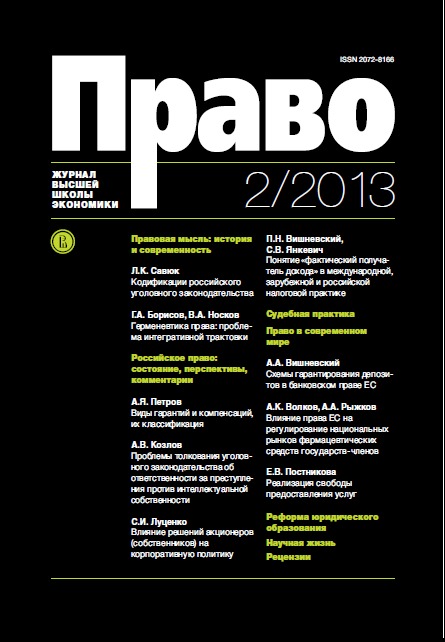Electoral Blocs in Russia: History and Prospects
Abstract
The article features the history of election blocs in the RF and studies the examples of agreements of political parties and establishing election blocs. The relevance to the topic may be explained by the current reform of election laws. The article describes the main stages of this reform, i.e. decreasing electoral threshold in the State Duma election, changes as to the requirements of minimum number of political parties from 40, 000 to 500 members, cancelling the requirement of collecting signatures by political parties not represented in the Duma etc. The article shows a sharp rise in the number of registered parties since the spring of 2012 and justifies that these parties will unify into election blocs due to insufficient number of members. The article makes an analysis of legal regulation of election blocs and agreements, public associations which have arranged such unions. All this promotes to the accumulation of practical experience. The analysis has allowed revealing the following trends in the development of the institution of election blocs in Russia. The election blocs achieved success at the federal level (State Duma elections) In 1993, i.e. when the Russian election system had started developing and the elections of 2003 – the last time when they with a status of election associations were eligible for plebiscite. However, the largest number of election blocs was represented at the 1995 elections. – none of them cleared a 5 % threshold. Simultaneously, legal regulation of election blocs strived to recognize the unions as associations, but there was no requirement as to making an agreement confirming the creation of an election bloc. In its legal norms, the RF Central Election Commission interpreted this agreement on creating an election bloc a succinct decision containing the agreement of public associations to enter this bloc and making up a joint list of nominees. As an example, of the agreement on creating an election bloc for a detailed analysis of advantages and disadvantages was taken an agreement on creating an election bloc for joint participation in the election to the State Duma concluded September 14, 2003 on the election bloc Rodina.
Copyright (c) 2013 Law Journal of the Higher School of Economics

This work is licensed under a Creative Commons Attribution-ShareAlike 4.0 International License.


















